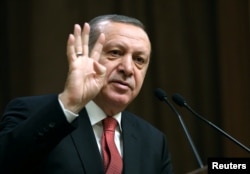British Prime Minister Theresa May is set to visit Turkey's capital Saturday, on her way home from Washington, where she met with U.S. President Donald Trump.
May will spend a day meeting with her Turkish counterpart, Binali Yildirim, and President Recep Tayyip Erdogan. May’s office, speaking ahead of the visit, described Turkey as an “indispensable partner and close ally.”
May’s visit is predicted to have a full agenda. "They do have important commercial ties,” observed international relations expert Soli Ozel of Istanbul’s Kadir Has University. "But there are also security issues on which Turkey and Britain cooperate. And Cyprus will be on the agenda; after all, these two countries are the guarantors of the Cyprus Republic."
British officials say Cyprus is expected to be a key area of talks, given that United Nations-sponsored reunification talks ended in deadlock earlier this month in Geneva.
Erdogan is widely identified as key to helping facilitate a breakthrough. Analysts warn the president may be wary of making concessions, given that he is courting Turkish nationalist votes ahead of a referendum in April to extend his powers.
Despite the sensitive nature of the talks, May is predicted to receive a warm reception.
"London has been a good friend to Ankara within the EU,” said visiting scholar Sinan Ulgen of Carnegie Europe.” It is one of the countries that has steadfastly championed Turkish accession. So in that sense there is a positive mood toward London."
Bilateral security cooperation, in particular in the field of counterterrorism, has further enhanced relations. Officials on both sides acknowledge a good level of cooperation in countering both Islamic State and the Kurdish rebel group, the PKK. That cooperation is expected to be featured in May’s talks.
May is also expected to be pressed on reports that British special forces are assisting the Syrian Kurdish militia, the YPG, in fighting Islamic State. Ankara accuses the YPG of being a terrorist organization linked to the PKK, which is fighting the Turkish state. Britain's official position is that it does not comment on the operations of its special forces.
Brexit, Britain's exiting of the European Union, could also provide a new basis for further bilateral cooperation, given that Ankara is also seeking to reassess its relations with Europe, argues analyst Ulgen.
"Turkey is exploring a new framework that would have components of the refugee deal, but also trade, collaboration in security and defense," Ulgen said. "And some of the themes and policy areas are exactly the policy that the U.K. will need to renegotiate as they are exiting. So the question here will be whether Turkey and the U.K. can foster close dialogue."
Since the Brexit vote, Ankara has been closely following developments in Britain.
“If they [the U.K.] are able to make a trade agreement between [the] EU, Turkey may choose this model and continue its relationship with the EU in the limits of this model,” said Turkey's International relations chief. Ayse Sozen Usluer. in an interview with VOA in October.
However, the increasing acrimony between London and the EU over Brexit is putting Ankara’s strategy in question.
“When Brexit happened, there appeared to be a window of opportunity for Turkey to align itself with the U.K., and the U.K. to do the same, in order to have their special relationship with the European Union,” pointed out International relations expert Ozel, “but the U.K. doesn't look to be getting a special relationship with the European Union. Therefore, those hopes have been crushed.”
Ozel also warned that Turkey's customs union with the EU, which prevents it from making third-party trade agreements, will likely hamper any efforts to further deepen bilateral trade with the U.K.
May is also under pressure at home to bring up growing human rights concerns in Turkey, amid Ankara’s ongoing crackdown after a failed coup in July.
“We have been clear in our support for Turkey's democracy and institutions since the coup last summer,” said a spokesman for May.
Critics say unlike some of its European partners, London has been muted in its criticism, a stance analysts say has also been welcomed by Ankara.






